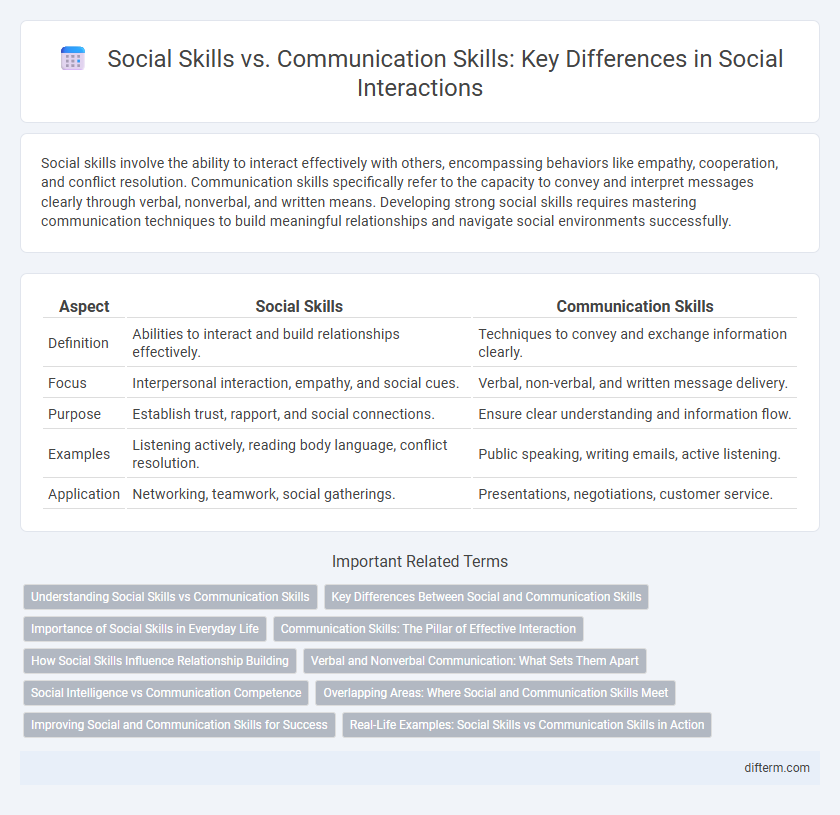Social skills involve the ability to interact effectively with others, encompassing behaviors like empathy, cooperation, and conflict resolution. Communication skills specifically refer to the capacity to convey and interpret messages clearly through verbal, nonverbal, and written means. Developing strong social skills requires mastering communication techniques to build meaningful relationships and navigate social environments successfully.
Table of Comparison
| Aspect | Social Skills | Communication Skills |
|---|---|---|
| Definition | Abilities to interact and build relationships effectively. | Techniques to convey and exchange information clearly. |
| Focus | Interpersonal interaction, empathy, and social cues. | Verbal, non-verbal, and written message delivery. |
| Purpose | Establish trust, rapport, and social connections. | Ensure clear understanding and information flow. |
| Examples | Listening actively, reading body language, conflict resolution. | Public speaking, writing emails, active listening. |
| Application | Networking, teamwork, social gatherings. | Presentations, negotiations, customer service. |
Understanding Social Skills vs Communication Skills
Understanding social skills involves recognizing the ability to navigate social interactions with empathy, active listening, and appropriate nonverbal cues. Communication skills specifically refer to effectively exchanging information through speaking, writing, or other mediums. Both skill sets are essential for building relationships, where social skills enhance emotional connection and communication skills ensure clarity and understanding.
Key Differences Between Social and Communication Skills
Social skills involve the ability to interact effectively with others through behaviors like empathy, active listening, and nonverbal cues, while communication skills specifically refer to the ability to convey information clearly through verbal and written means. Social skills encompass understanding social norms and building relationships, whereas communication skills focus on the methods and clarity of message delivery. Mastery of social skills enhances interpersonal connections, while strong communication skills ensure accurate and efficient information exchange.
Importance of Social Skills in Everyday Life
Social skills, encompassing abilities like empathy, active listening, and conflict resolution, are essential for building and maintaining meaningful relationships in everyday life. Unlike communication skills that primarily focus on exchanging information, social skills enable individuals to navigate social interactions effectively, fostering trust and collaboration. Mastery of social skills enhances emotional intelligence, leading to improved teamwork, better problem-solving, and overall personal and professional success.
Communication Skills: The Pillar of Effective Interaction
Communication skills form the cornerstone of effective interaction by enabling clear message delivery and active listening. Mastery of verbal and non-verbal communication enhances understanding and reduces conflicts in social settings. Developing strong communication skills cultivates meaningful connections and fosters mutual respect in personal and professional relationships.
How Social Skills Influence Relationship Building
Social skills, encompassing empathy, active listening, and cooperation, are fundamental in building strong relationships by fostering trust and emotional connection. Effective communication skills alone, such as clear articulation and information exchange, are insufficient without the social ability to read social cues and respond appropriately. Mastery of social skills enhances relationship quality by encouraging mutual understanding, conflict resolution, and long-term rapport development.
Verbal and Nonverbal Communication: What Sets Them Apart
Verbal communication involves the use of words, tone, and clarity to convey messages effectively, while nonverbal communication relies on facial expressions, gestures, body language, and eye contact to express emotions and intentions. Social skills encompass both verbal and nonverbal communication, enabling individuals to navigate interactions, build relationships, and interpret social cues accurately. Mastery of both forms enhances overall communication competence and fosters stronger interpersonal connections.
Social Intelligence vs Communication Competence
Social intelligence encompasses the ability to understand and manage interpersonal relationships effectively, while communication competence refers to the skillful use of verbal and nonverbal messages to achieve desired outcomes. High social intelligence enhances empathy, emotional regulation, and social awareness, fostering meaningful connections in diverse social settings. In contrast, communication competence emphasizes clarity, adaptability, and appropriateness, ensuring messages are conveyed accurately and received positively across various contexts.
Overlapping Areas: Where Social and Communication Skills Meet
Social skills and communication skills overlap significantly in areas such as active listening, empathy, and nonverbal cues interpretation, which are essential for effective interpersonal interactions. Both skill sets rely on the ability to convey and interpret messages clearly, fostering mutual understanding and relationship building. Mastery in emotional intelligence strengthens this overlap, enhancing conflict resolution and collaborative problem-solving in social contexts.
Improving Social and Communication Skills for Success
Improving social skills enhances the ability to navigate interpersonal relationships through empathy, active listening, and nonverbal cues. Communication skills, including clarity, tone, and persuasion, are essential for effectively conveying ideas and building trust. Developing both skill sets leads to greater success in personal and professional environments by fostering collaboration and reducing misunderstandings.
Real-Life Examples: Social Skills vs Communication Skills in Action
Social skills involve interpreting nonverbal cues, such as recognizing when a coworker appears stressed and offering support, while communication skills pertain to clearly expressing thoughts, like presenting ideas effectively during a team meeting. In networking events, social skills help in building rapport through active listening and empathy, whereas communication skills ensure concise and persuasive self-introductions. Real-life success often depends on integrating social awareness with verbal and written communication to navigate complex interpersonal situations.
social skills vs communication skills Infographic

 difterm.com
difterm.com